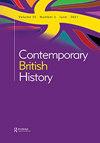The British Council and British cultural diplomacy 1934-1959: a new form of diplomacy?
IF 0.6
2区 历史学
Q1 HISTORY
引用次数: 0
Abstract
ABSTRACT There are grounds for considering the creation of the British Council in the interwar period as a manifestation of post-World War One internationalism and the search for a ‘new diplomacy’. Yet, as an arms-length body established by the Foreign Office (FO), it was expected to support not supplant traditional diplomats. If the creation of a body dedicated to cultural relations did indeed represent a new departure for British diplomacy, to what new destinations did it hope to carry that diplomacy? Focusing on the first decades of the Council’s existence, this article shows that the British Council’s growing commitment to cultural internationalism did not prevent it from continuing to function as a vector for British cultural propaganda. It also argues that the transition to Commonwealth did not diminish a commitment to the Empire, and shows the importance of recognising the tensions at work within the model of cultural internationalism adopted by the Council given that development would represent an increasingly significant proportion of its work from the 1960s onwards.英国文化协会与英国文化外交1934-1959:一种新的外交形式?
有理由认为,两次世界大战之间英国文化协会的成立是一战后国际主义的表现,是对“新外交”的探索。然而,作为一个由外交部(FO)设立的独立机构,它被期望支持而不是取代传统的外交官。如果成立一个致力于文化关系的机构确实代表了英国外交的新起点,那么它希望将这种外交带到哪些新的目的地呢?本文聚焦于英国文化协会成立的头几十年,表明英国文化协会日益致力于文化国际主义,但这并不妨碍它继续作为英国文化宣传的载体发挥作用。它还认为,向英联邦过渡并没有减少对帝国的承诺,并表明认识到理事会所采用的文化国际主义模式中工作中的紧张关系的重要性,因为从20世纪60年代起,发展将占其工作的越来越重要的比例。
本文章由计算机程序翻译,如有差异,请以英文原文为准。
求助全文
约1分钟内获得全文
求助全文
来源期刊

Contemporary British History
HISTORY-
CiteScore
1.40
自引率
14.30%
发文量
34
期刊介绍:
Contemporary British History offers innovative new research on any aspect of British history - foreign, Commonwealth, political, social, cultural or economic - dealing with the period since the First World War. The editors welcome work which involves cross-disciplinary insights, as the journal seeks to reflect the work of all those interested in the recent past in Britain, whatever their subject specialism. Work which places contemporary Britain within a comparative (whether historical or international) context is also encouraged. In addition to articles, the journal regularly features interviews and profiles, archive reports, and a substantial review section.
 求助内容:
求助内容: 应助结果提醒方式:
应助结果提醒方式:


